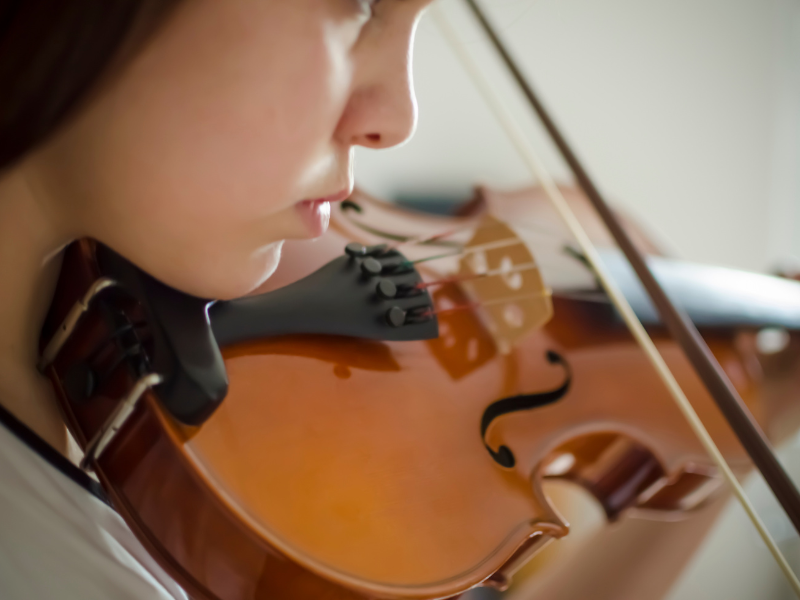Strings for the win!

Here is a bright light in 2020. This study is one of the first randomised studies that compares an instrumental music program during class (in this case, a string-based program) with a music appreciation type of classroom program. The study followed the students for two years and measured how the different types of music learning impacted on several executive function skills.
First of all, why all the hype about a randomised study? A randomised study is one where the participants in either the instrumental or appreciation music programs are randomly assigned, rather than choosing how they would like to learn music. This type of design takes away a lot of variables such as interest, motivation and parental support and means we can see more clearly what the impact of the different ways of learning music might have on executive function skills.
Second of all, which executive function skills did they measure? The suite of executive function skills include attention, inhibitory control, reasoning and planning, so there is a lot to choose from. In this study, they focused on working memory, attention, cognitive flexibility and coordination.
Finally, what did they find? After two years of music learning, both for two 45-minute lessons per week within the curriculum time, they found that the instrumental group, consisting of violin and cellos, had greater improvement than the music appreciation class in working memory, attention, processing speed, cognitive flexibility, matrix reasoning, sensorimotor hand function, and bimanual coordination. The combination of these improved skills can lead to learning new concepts more quickly, integrating new ideas into their memory systems more effectively and being able to solve problems through both analytical and creative processing.
The students in this study learned music in their middle school years of 10-12 years, and with this enhanced combination of skills, they would be very prepared to take on the increased complexity of learning into their high school years.
And they would have a great appreciation and hopefully a love for their string instruments. Strings for the WIN!
Free Easter campaign download with posters and social tiles to help students understand the value of music learning.
What if you could advocate for music education without adding more work to your already packed schedule?
Engaging in musical activities offers profound benefits for our brains, enhancing various cognitive functions and emotional well-being.
While there can only be one winner of the BBB Music Teacher Award, we also recognize the outstanding efforts of our 2025 Runner-Up, Ruby Mensforth—a teacher whose dedication to fostering a love of music has left a lasting impact on her students.
Playing an instrument or singing in a choir isn’t just fun—it’s great for brain health too. A recent study found that people with musical experience have stronger memory and thinking skills than those without.
For many music teachers, March means concert season, assessment planning, and advocating for the importance of music education as budgets and schedules for next year take shape.
We know that speaking up for music in schools can feel overwhelming—but you don’t have to do it alone.
If you've ever conducted or played in an ensemble, you’ve likely felt it—that moment when everything clicks, the music soars, and your group performs at a level beyond anything you thought possible.
The World Economic Forum's Future of Jobs Report 2025 highlights the critical skills that will define the workforce of tomorrow.
A recent study in Ear and Hearing investigated how aging and hearing loss influence music perception, focusing on melody and timbre discrimination.
A new study in the Journal of Neuroscience reveals that our brains start processing rhythm as early as 27 weeks into pregnancy.
The 2025 Celebrate to Advocate Calendar is your go-to guide for making advocacy effortless this year!
A recent study from Waseda University has uncovered that when individuals listen to music, their heart rates synchronize, reflecting a unified physiological response.
A groundbreaking study in Nature Human Behaviour has revealed a fascinating genetic connection between musical rhythm skills and language-related traits, including dyslexia.
Recent research from the Georgia Institute of Technology has unveiled compelling insights into how music affects learning, memory, and emotions.
A recent study from Aarhus University reveals that while older adults can remember familiar music as well as younger individuals, their brains engage differently during the process.
Take our free, 60 second quiz and maximize your advocacy impact by discovering your advocacy style and knowledge gaps.
Thank you for a wonderful 2024! Here’s a little gift from BBBB to you.
Music has always been a go-to for lifting our spirits, but did you know classical music might take it a step further by actually helping treat depression?



















